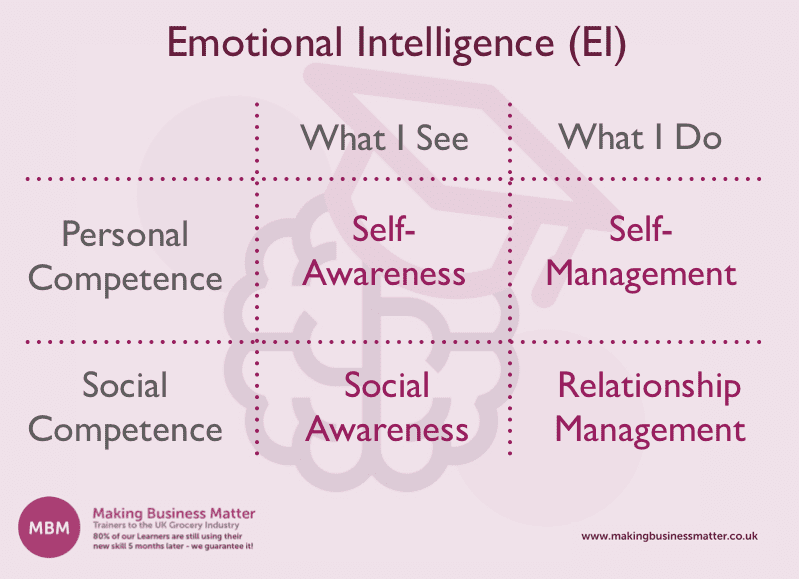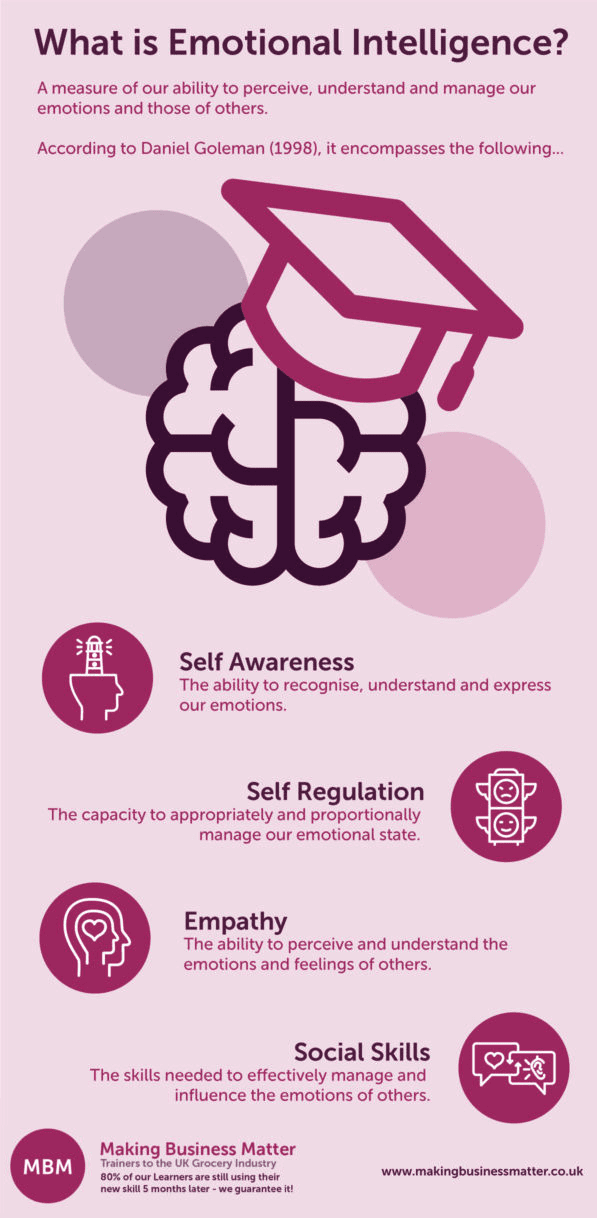Mindful of Emotional Intelligence
In past refections, I talk about the new manager and challenges for middle managers. In both I mention authenticity and it’s meaning. Here I want to take a step back from authentic leadership to concentrate on emotional intelligence (EI). This is directed at new managers as I believe that here is the greatest opportunity at the beginning of someone’s managerial career. That is not to say that other managers are excluded, just that the scenery is different.
The landscape for a new manager is very different – new responsibilities, new people and new emotions. While moving into management is tough, if the individual is mindful of emotional intelligence, it can make a huge difference. Being aware of, or even actively practising, emotional intelligence will aid the new journey and will define your management career.
I appreciate this is a bold claim but look around at who is saying this. Social media, TED talks and books are filled with this as a way forward. Gary Vaynerchuk, the CEO of Vaynermedia, claims that emotional intelligence is the biggest element of leadership and culture right now. I don’t believe that people are naturally born with this, nor do I believe in the notion of genius. I do believe there are outliers who are more talented than others in certain elements. What emotional intelligence does require is practice. The best people at their art, practice what they do, management is no different.
Four Elements of Emotional Intelligence
Daniel Goleman, the prolific author on EI states that there are four main elements. Self-awareness, self-regulation or management, empathy or social awareness and finally, pulling this all together to accomplish skilled relationships. Within this, there are sub-factors, for the purpose of this reflection I will stick with the four mentioned. When we say learning about EI, what we really mean in being in tune with all four elements as much as possible.
I genuinely don’t believe a course is enough to get this over and have a meaningful purpose. The four elements mentioned are also intertwined, they are not exclusive of each other. Handling and being aware of myself while in a potential conflict situation is where the real practice comes in. More than this, it is about deeply understanding the effect of our behaviour when these occurrences happen.

Let’s step offstage for a moment. You witness a manager speaking with another colleague. How do you want the manager to be with you? Attentive? Honest? Making you feel comfortable speaking about uncomfortable issues? Now reflect on the strengths you have in these areas that you have, how would you score yourself? The self-awareness element is a real look at ourselves and being aware of our emotions at any particular time. Within this, it is being comfortable with the emotions we have and recognising what they are. As Daniel Goleman states, every emotion serves a purpose. That said, if we are confused by it then we lose the purpose. Understanding our purpose as managers and critical relationships is key to building a deeper sense of ourselves and who we are.
Book Smart and Street Smart Debate
I value education enormously and firmly believe that knowledge is a powerful thing. There is still the ongoing debate over book smart and street smart, intelligence quotient (IQ) versus emotional intelligence (EI). There seems to be a constant conversation that one is better than the other. Daniel Goleman, the author of Emotional Intelligence confronts this debate head-on. He states that IQ and EQ are not opposing competencies, they are, however, separate. When we encounter people, it can be difficult to instantly assess IQ but relatively easy to see EQ. In this current climate, we do need the book smarts, it will always be critical to keeping moving forward and solving the problems of our time. Emotional intelligence will be the driver of people to solve solutions.
In terms of management, people with high EQ bring people with them. This is not to say that intelligent people cannot be emotionally intelligent, the very opposite, they can. The debate about one over the other is moot and becoming irrelevant. We are coming into an age where job seekers are choosing who to work for and applicant competition is high. A reputation for great management and leadership will win out over gimmicky free fruit in the kitchen. Within organisations, new managers with an appreciation of EI have an inner motivation and yet will adapt and be flexible.
This goes hand in hand with the vulnerability mentioned below. Imagine the scene, you have agreed a way forward, the resources and targets are set in place. One team member identifies a more efficient way at the last minute. An insecure manager goes with the plan without listening, an emotionally intelligent manager listens.
Higher Expectations Than is Realistic
Being in a management or leadership position will place certain demands on you. As a new manager, you probably have higher expectations of yourself than is realistic. There will be a high temptation to get quick wins and produce fast results. While this is admirable, over the longer term, the team will require much more attention. Don’t replace results for the time and understanding spent with the team. This time spent with all individuals will aid in building your emotional intelligence, in some instances through sheer observation. Where emotional intelligence takes effect is the noticeable difference in their behaviour. That kind of acuity helps you in understanding others, it also means that you are demonstrating genuine care and empathy.
Authentic managers who see the opportunity to grow their EI capability will keep asking questions of themselves and others. They will constantly reflect on situations, their behaviour and that of others. The difference is stark. Those who say it really do not have the fellowship of the team, those who actively practice it will. It can appear like a constant struggle, if this is genuine, the team will look to talk openly to you providing that critical information you need to enhance your awareness and indeed motivation of the team. It also shows a vulnerability to others; this is a huge positive. It tells others that you know you are not the end product but are willing to be open and learn. With vulnerability comes trust. Why? Because people are more willing to help and open up about the things they care about when there is a genuine effort.

Emotional Intelligence in Teams
Being a new manager more than likely means you are part of a team or a group. If this is a new team, there is a lot to learn about the others so begin your EI journey with yourself. Self-regulation has two key elements. These are trustworthiness and conscientiousness. The first is about your own personal standards, honesty and integrity. Ask yourself what are they and how do I communicate these as part of a team? It’s exactly how it is written if someone asks you for a private word, it remains private. This maintains your integrity and personal standards. The honesty element will flow through the conversation. Make the point that they said it was a private conversation and that this will not be spoken about outside and stick to it.
Of course, there are extremes to this, personal danger or a clear risk to the business. Even in these circumstances, you can maintain your integrity. Own your mistakes, admit that you are not perfect and that some work is bigger than you alone. The vulnerability shown here will provide the team with confidence.
Emotional Intelligence to Navigate Conflict
Conflict management is a common theme in current development programmes and general courses. One current trend within conflict management is ‘having difficult conversations’. This could be over a performance issue, behaviour or another element that is regarded as unacceptable. The main fear here is how the conversation will go and if it will indeed lead to further conflict. Emotionally intelligent managers handle these situations head-on with diplomacy and tact. There is no need to take any other stance to accept aid the individual back to the right performance or behaviour.
This will occur through considering the issue, is it out of kilter with the normal performance or a progression of things. Conflict, while you are a manager, is inevitable. There will be differences of opinions over set work, performance indicators or even who receives the work.
Empathy is Key
Empathy is a key criterion for EI. It is more than understanding others, it is a general sense of them and their wellbeing. How are they behaving, is something out of kilter? In today’s diverse society, empathy means much more. It is about embracing the diverse culture and looking to nurture opportunities from it. Look around your workplace, is it representative of the geographical area you work in or does the organisation hire a certain ‘type’. This is why I say that new managers have the greatest opportunities. They are not hindered by cultural pasts, it is an opportunity to truly diversify. It is more than shaking the dust off the job description, it is looking at what is really required rather than what was 12 months ago.

Whichever background your team are from, empathy considers their development. This may be in a coaching style, development courses or just the opportunity to work to enhance their skills. This may be away from the team. That kind of encouragement and development will pay dividends if it has been truly thought through and is meaningful to the individual.
Empathy ties into all the other competencies identified as it concerns the individual and the wider group of people. I believe that empathy requires reflection and thought. Similar to managing conflict, it is understanding the deeper values of the people around you. They may appear to be the best at what they do, their results may even show it. What is going on underneath the surface, actual development may not be right for them, additional responsibility may be.
Final Thoughts
New managers have taken a conscious decision to accept the responsibility and accountability for their work and more importantly their people. Emotional intelligence is much more than a competency, it’s a higher level of intellect that goes beyond academia.
If we can take a lesson from the schools that are teaching about self-awareness, management development will change significantly. If we want that learning to stick and be purposeful, new managers should be allowed the time and space to develop.
Being a new manager is a real opportunity to stop looking backwards for solutions, but to self-generate them through their people. Will mistakes be made? Absolutely. However, it is more about how we handle these and move through them.
Being emotionally intelligent is not beyond any of us if we choose to engage. Through engagement we can truly be self-aware, we can self-manage and seek to understand other emotions through empathy and compassion.




